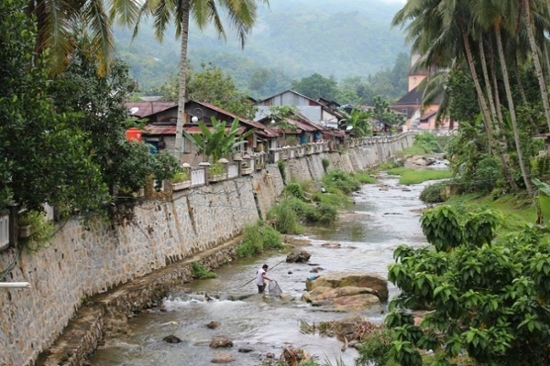Konferensi Nasional Hukum Tata Negara
During week two, stress levels rose because it was the final week of preparations before the first annual National Conference on Constitutional Law (Konferensi Nasional Hukum Tata Negara). I took a break from the tense atmosphere to spend a couple of hours in a classroom with Prof. Yoserwan, a criminal law professor, who gave me a private lecture on the basics of Indonesian law and the constitution. Indonesia officially attained independence from the Dutch in 1945 (although the Japanese invaded them during WWII). Since then, Indonesians have amended their constitution four times, and it is still a work in progress. There were a few notable bits of information that I picked up from my lecture, primarily because they contrasted with our system in the United States. For instance, Indonesia does not use a jury; rather, a judge (or sometimes a panel of judges) makes the decision regarding the outcome of a case. Another aspect of Indonesian law that is markedly different from law in the U.S. is related to their use of precedent. Precedent is considered a persuasive authority, but it is not binding and courts rarely adhere to it. Also, within the private law sector, Indonesia has a religious division that specifically deals with issues involving marriage, divorce, Sharia, and Islamic economy. Finally, Indonesia has a Supreme Court (Mahkamah Agung) in addition to a Constitutional Court (Mahkamah Konstitusi). Mahkamah Agung is the highest court of appeals, whereas Mahkamah Konstitusi is only responsible for cases involving a constitutional issue, reviewing legislation that conflicts with the constitution, settling disputes regarding the results of general election, settling disputes between state institutions, and dissolving political parties.
The next couple of days leading up to the conference were pretty uneventful because my fever peaked and I was on bed rest in the hopes that I would recover in time to attend it. As luck would have it, on the day of the opening ceremony I felt a bit better, so my host family allowed me to go. I spent the 2.5-hour drive to Sawahlunto with my face glued to the window, so I wouldn’t miss a single village, fruit stand, or rice paddy nestled within the mountainous Sumatran rainforest. Sawahlunto is a small city that was founded during the Dutch era for the purpose of mining coal. The Dutch used Javanese slaves (from the neighboring island of Indonesia) to do this work, and now there is a museum about it. The newly elected mayor is trying to make Sawahlunto into a tourist destination, so, needless to say, he was incredibly excited that a bule came to his city. He also requested that I tell all of my American friends to come to Sawahlunto, so consider this my obligatory plug for the mayor. Although it is a quaint city with a fair amount of history, I can’t really imagine that Sawahlunto will become a huge tourist destination because it’s small, isolated, and landlocked. Also there are only two hotels in the city, and although I can’t speak to the quality of the other hotel, the one I stayed in was deteriorating, and I had to share my room with several 4-inch-long cockroaches.
The opening ceremony for Konferensi Nasional Hukum Tata Negara began with a traditional Minang welcoming dance called tari pasambahan, and when the performance concluded, the dancers presented the guests of honor with a betel leaf from a carano basket to eat. The keynote speaker from the first night was Prof. Dr. Jimly Asshiddiqie, who assisted in founding Mahkamah Konstitusi and served as its first Chief Justice. Prof. Saldi introduced me to him, but Mr. Jimly was noticeably unimpressed by me when he learned that I don’t possess a PhD. The next few days were packed with speakers, panels, and workshops involving every imaginable topic under the constitutional law umbrella. Unfortunately, the entire conference was conducted in Bahasa, so I could hardly understand any of it. Celok attempted to convey the general ideas of each speaker for me, but her vocabulary is limited, so the details of their research were lost in translation. Occasionally, I was able to meet with the speakers (assuming they could speak English) after their presentations to discuss their research. One talked to me about how democracy is incompatible with some of the indigenous cultures in Indonesia. She claimed that this gap could be remedied if the House of Representatives (Dewan Perwakilan Rakyat, otherwise known as DPR) lessened their political party affiliations, and, instead, focused on representing the people of their provinces. Another panel discussed the timing of elections. At the moment, each general election is held at a different time throughout the year; however, there is talk about changing them so that all of the major elections will be held simultaneously. Most scholars (including Prof. Saldi) seemed to agree that a change of this nature would cause a great deal of confusion because there would be too many candidates to keep track of. The conference concluded with the presentation of the Muhammad Yamin Constitution Award, which went to Prof. Sri Soemantri Martosoewignjo, senior advocate Adnan Buyung Nasution, and journalist Kompas Budiman Tanuredjo. This award aims to pay tribute to Yamin’s influence in the formation of the Indonesian Constitution, and to honor the individuals who dedicate their lives to protecting constitutional values in society.
